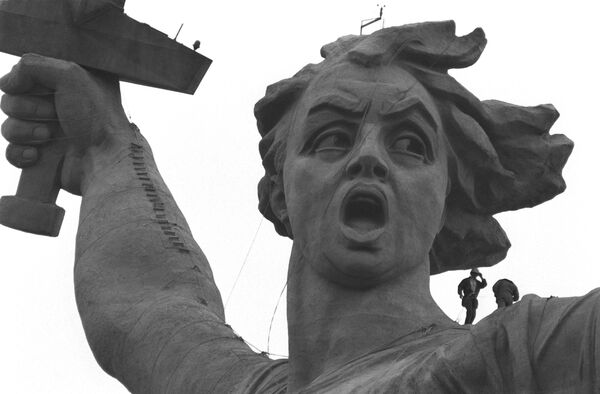What does it mean when a world famous WWII monument starts hanging out on Facebook and Twittering?
It came as a surprise for many when patriotic blogs on the behalf of one of Russia’s most recognized WWII monuments in the city of Volgograd appeared on Facebook and Twitter just over a month before the country’s parliamentary elections scheduled for December 4 are to kick off.
This could be viewed as somebody’s witty joke, but overly enthusiastic compliments to the city authorities and pro-Kremlin United Russia party members on LiveJournal and Facebook accounts attributed to the famous Motherland sculpture have raised questions among some Russian analysts and bloggers.
Overlooking the city from a high hill known as Mamayev Kurgan, the huge, 8,000-ton ferro-concrete statue of a woman wielding a sword above her head is the main symbol of the Battle of Stalingrad that marked a turning point in the 1941-1945 Great Patriotic War after which the Nazi defeat became inevitable.
“I overlook Mamayev Kurgan and observe everything that happens in our great country,” the author of the rodina_mother LiveJournal account wrote in the first post on October 25, addressing the readers as “my dear kids.”
“I am so happy to see how everything is good all around: peaceful skies overhead, people going to work, arranging their households, dating, falling in love, getting married…” the post reads.
Blog posts praising United Russia heavyweights Anatoly Brovko, who heads the Volgograd administration, and Viktor Zubkov, Russia’s first deputy prime minister and State Duma candidate, made some analysts suspect that United Russia activists could be behind the campaign, while others insisted that it looks more like an opposition invention.
In another post the “statue” describes how “my son Viktor Zubkov” and “my other son Anatoly Brovko” launched a “good and necessary” campaign to plant “a million trees in the Volgograd region.”
“If those blogs praise a leader on United Russia’s election list and Volgograd authorities, they may be invented by people who are close to them,” said Nikolai Petrov from Carnegie Moscow Center.
Provocation?
The heroic history of Volgograd (former Stalingrad), a site of one of the bloodiest battles of WWII, often becomes a source of inspiration for political PR, the analyst said. In May, Russian Prime Minister Vladimir Putin announced the creation of the All-Russia People’s Front designed to boost his United Russia party’s fading popularity during a party congress in Volgograd.
“We can suggest that this is a variation of the same idea,” Petrov said. His remarks were echoed by Communist lawmaker Nina Ostanina, who agreed that United Russia supporters could be behind the blogs.
A spokeswoman for United Russia’s Volgograd branch dismissed the allegations.
“United Russia party’s regional branch has no connection to the Motherland blog,” Olga Stavskaya responded to RIA Novosti by e-mail.
It is not the first time when United Russia is suspected of using various “strange” political technologies, and the party has always dismissed such suggestions as “provocation,” analyst Petrov said. The Motherland’s blogs may therefore turn out to be “anti-PR” aimed at discrediting the party, he said.
Some activists have already described the campaign as a “monstrous cynicism” and mockery of the memory of thousands of WWII heroes who had lost their lives in the five-month Battle of Stalingrad.
Political analyst Vladimir Pribylovsky said “some skeptics and critics” from the opposition had probably launched the blogs, which he described as “postmodernist jeering,” while Anna Lunyova from Russia’s Center for Political Information said it would be clear who was speaking on behalf of the statue after the presidential elections in March 2012.
“If they [the blogs] continue after the polls, no questions will remain,” she said, adding: “If it is a spontaneous expression of someone’s soul, then this soul should be very loyal [to the authorities]. It’s not a tradition for Russian internet [users] to speak so enthusiastically about Russian officials’ activities.”
Prominent Russian blogger Anton Nosik, known for his criticism of the government, said he liked the idea of a “speaking statue” even if it was United Russia’s initiative.
“It is good if United Russia, which has always shown disregard to ordinary people, has finally undertaken an attempt to communicate with them,” he said.




